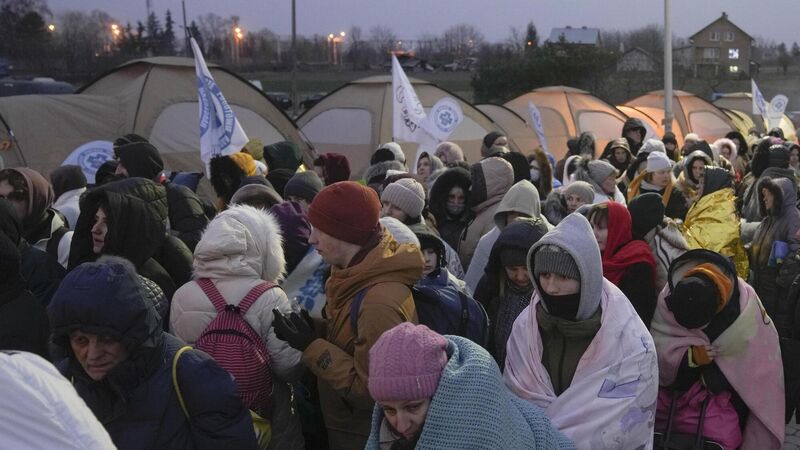Ukraine war putting 'very significant' strain on funding of international protection system

More people have applied for international protection in Ireland in the first five months of this year than had been projected for the whole of 2022. Those applicants do not include the more than 31,000 refugees who have arrived in Ireland from Ukraine since Russia’s attack on that country began in late February. Photo: AP/Markus Schreiber
Ireland’s international protection system is coming under “very significant funding pressure” as a result of the war in Ukraine, an Oireachtas committee has heard.
Kevin McCarthy, the head of the Department of Children which has responsibility for Ireland’s direct provision system, said that notwithstanding the conflict in eastern Europe, applications for international protection in Ireland “have been growing hugely” in recent months.
The International Protection Office (IPO) is an office within the Immigration Service Delivery that is responsible for processing applications for international protection under the International Protection Act 2015. It also considers whether applicants should be given permission to remain.
Addressing the Public Accounts Committee on Thursday, Mr McCarthy said the timelines and projections in place to eliminate Ireland’s direct provision system by the end of 2024 “are now coming under a bit of stress”.
He said that target, together with the Department’s stated goal of removing the State’s dependency on emergency accommodation for protection applicants, has proven to be “challenging and ambitious”.
When it was put to him by Fianna Fáil’s Paul McAuliffe that such a statement could be interpreted as meaning the targets won’t be met, Mr McCarthy reiterated that “we are committed to meeting it”.
Mr McCarthy’s statements came amid statistics provided to the committee showing that more people have applied for international protection in Ireland in the first five months of this year than had been projected for the whole of 2022.
Those applicants do not include the more than 31,000 refugees who have arrived in Ireland from Ukraine since Russia’s attack on that country began in late February.
In terms of sourcing additional emergency accommodation spaces for all those applicants whom the State has an obligation to house, Mr McCarthy said that an additional 4,000 spaces will shortly be provided via student accommodation which has been vacated for the summer.
However, he acknowledged that accommodation will have to be vacated once more come September and the beginning of the new academic year. Despite the pressure being brought to bear on the international protection system, the Department’s budget for direct provision has increased by just €13m for 2022 to €231m.
Mr McCarthy acknowledged that “there is a very, very significant cost pressure due to Ukraine”. He said that his Department is in the process of bringing forward proposals for supplementary funding to the Department of Public Expenditure with a view to mitigating that pressure.
Regarding the granting of contracts for the provision of catering services for Ukrainian arrivals to Aramark, a facilities management corporate which already operates three direct provision centres, Mr McCarthy said that Aramark and one other company had been “the only two facilities management companies who were able to meet” the needs of the Department at short notice.
He said that it is the case that those contracts are not compliant with public procurement laws, which is “a factor of the emergency response”.
The department, when having assumed responsibility for direct provision from the Department of Justice in October 2020, deemed all the 151 outstanding direct provision contracts, valued at €91m, had been secured in breach of procurement law.
“The unequivocal position is that we want to get to fully compliant procurement,” Mr McCarthy said, adding that his department had been “on a good pathway “ to achieving that before events overtook the process.
The committee heard how the department has closed certain direct provision centres for “persistently not meeting contractual obligations”, in terms of issues such as fire safety.
It further heard that some residents of the system may have been accommodated in DP centres for as long as seven years, but that anyone who “goes to that length then has probably received a negative decision along the way”.












